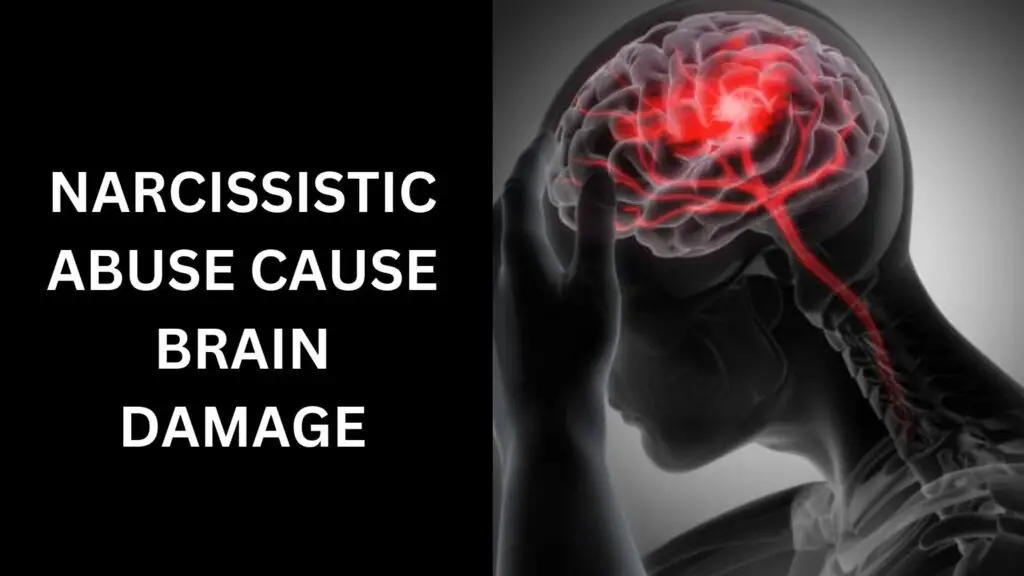Can Narcissistic Abuse Cause Brain Damage?
Narcissistic abuse is a complex and harmful form of psychological manipulation that can have devastating effects on its victims.
Narcissistic Abuse Cause Brain Damage, In recent years, there has been growing awareness of the link between narcissistic abuse and brain damage, highlighting the serious long-term consequences of such abuse.

Introduction to Narcissistic Abuse Cause Brain Damage
Narcissistic abuse is a pattern of behavior characterized by manipulation, exploitation, and emotional cruelty inflicted by individuals with narcissistic personality traits.
Victims of narcissistic abuse often experience gaslighting, belittlement, and control tactics that erode their self-esteem and mental well-being.
Understanding Brain Damage
Brain damage refers to the impairment or deterioration of brain function due to various factors such as trauma, disease, or prolonged stress.
There are different types of brain damage, including traumatic brain injury (TBI), stroke, and neurodegenerative diseases like Alzheimer’s.
Link Between Narcissistic Abuse and Brain Damage
Research suggests that the chronic stress and psychological trauma inflicted by narcissistic abuse can contribute to significant changes in the brain.
Here are some key factors linking narcissistic abuse to brain damage:
Psychological Manipulation
Narcissists employ manipulative tactics such as gaslighting, emotional blackmail, and invalidation to control and disorient their victims.
This constant psychological warfare can lead to heightened stress responses and altered brain function over time.
Chronic Stress and Cortisol Levels
Prolonged exposure to stress triggers the release of cortisol, a hormone that plays a role in the body’s fight-or-flight response.
Elevated cortisol levels due to ongoing narcissistic abuse can damage brain cells and disrupt neurotransmitter balance, contributing to cognitive decline and emotional instability.
Trauma and Neural Pathways
Traumatic experiences, including emotional abuse and psychological trauma from narcissistic relationships, can impact neural pathways in the brain.
These disruptions may manifest as memory problems, difficulty regulating emotions, and impaired decision-making skills.
Signs and Symptoms of Brain Damage from Narcissistic Abuse
Victims of narcissistic abuse may exhibit various signs and symptoms indicative of brain damage:
- Cognitive Impairment: Memory lapses, confusion, and difficulty concentrating.
- Emotional Dysregulation: Mood swings, anxiety, depression, and heightened sensitivity to stressors.
- Physical Health Issues: Headaches, insomnia, digestive problems, and compromised immune function.
Recovery and Healing
While the effects of narcissistic abuse on the brain can be profound, recovery and healing are possible with the right support and interventions.
Therapeutic approaches such as trauma-informed therapy, cognitive-behavioral therapy (CBT), and mindfulness practices can help survivors rebuild their sense of self-worth and resilience.
In addition to professional therapy, self-care strategies such as maintaining healthy boundaries, practicing self-compassion, engaging in creative outlets, and fostering supportive relationships are crucial for promoting healing and restoring brain function.
People also ask
What happens to the brain after narcissistic abuse?
After experiencing narcissistic abuse, the brain can undergo significant changes.
Chronic stress and psychological trauma can lead to altered brain function, including disruptions in neural pathways, increased cortisol levels,
potential cognitive impairment, emotional dysregulation, and physical health issues.
What does narcissistic abuse do to you?
Narcissistic abuse can have severe psychological and emotional impacts, including lowered self-esteem,
anxiety, depression, trust issues, emotional instability, difficulty forming healthy relationships, and in some cases, symptoms akin to PTSD.
What part of the brain is damaged with narcissism?
Narcissistic abuse can lead to damage or changes in various parts of the brain, including the prefrontal cortex (associated with decision-making and self-control),
the amygdala (linked to emotions and fear responses), and the hippocampus (related to memory and stress regulation).
What does PTSD from narcissistic abuse look like?
PTSD (Post-Traumatic Stress Disorder) resulting from narcissistic abuse can manifest as flashbacks, nightmares, hypervigilance,
emotional numbness, avoidance of triggers, heightened anxiety, difficulty concentrating, mood swings, and intrusive thoughts related to the traumatic experiences.
Conclusion
Narcissistic abuse is not only emotionally damaging but can also cause significant harm to the brain.
Understanding the link between narcissistic abuse and brain damage underscores the importance of early intervention, trauma-informed care, and ongoing support for survivors on their journey to healing and recovery.

Welcome to Narcissist Home! My name is Dr. Suzanne Holroyd, and I am thrilled to be your guide in navigating the complex world of narcissism. With over 50 years of experience in this field, I have dedicated my career to understanding and addressing the nuances of narcissistic personality traits and behaviors.






